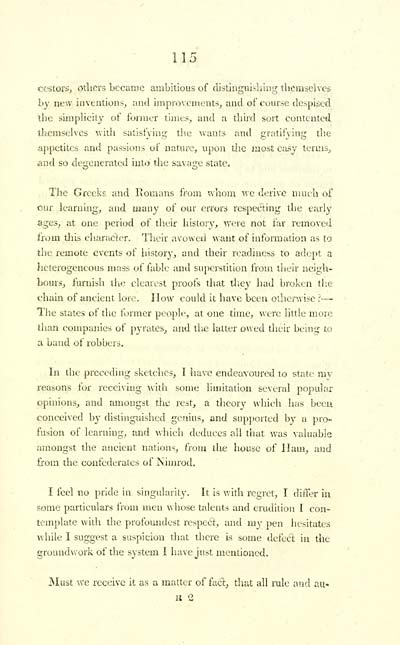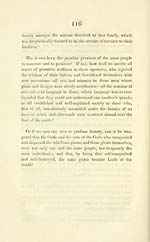Blair Collection > Celtic researches, on the origin, traditions & language, of the ancient Britons
(205)
Download files
Complete book:
Individual page:
Thumbnail gallery: Grid view | List view

115
cestorsj others became ambitious of dislinguishing themselves
by new inventions, and impiovenients, and of course despised
tlic simplicity of former times, and a third sort contented
themselves with satisfying the wants and gratifying the
appetites and passions of nature, upon tlie most easy terms,
and so degenerated into the savage state.
The Greeks and Romans from whom we derive much of
our learning, and many of our errors respecting the early
ages, at one period of dieir histoiy, were not far removed
iiom tliis character. Their avowed want of information as to
the remote events of history, and their readiness to adopt a
heterogeneous mass of fable and superstition from their neigh-
bours, furnish the clearest proofs that tliey had broken the
chain of ancient lore. How could it have been otlicrwise ? — -
The states of the former people, at one time, were httle more
than companies of pyrates, and the latter owed their being to
a band of robbers.
In the preceding sketches, I have endeavoured to state mv
reasons for receiving with some limitation several popular
opinions, and amongst the rest, a theory which has been
conceived by distinguished genius, and supported by a pro-
fusion of learning, and which deduces all that Λvas valuable
amongst the ancient nations, from tlie house of Ham, and
from the confederates of Niinrod.
I feel no pride in singularity. It is with regret, I differ in
some particulars from men whose talents and erudition I con-
template with the profoundest respect, and my pen hesitates
while I suggest a suspicion that there is some defccl; in the
groundwork of the system I have just mentioned.
Must we receive it as a matter of fad, that all rule and au-
H 2
cestorsj others became ambitious of dislinguishing themselves
by new inventions, and impiovenients, and of course despised
tlic simplicity of former times, and a third sort contented
themselves with satisfying the wants and gratifying the
appetites and passions of nature, upon tlie most easy terms,
and so degenerated into the savage state.
The Greeks and Romans from whom we derive much of
our learning, and many of our errors respecting the early
ages, at one period of dieir histoiy, were not far removed
iiom tliis character. Their avowed want of information as to
the remote events of history, and their readiness to adopt a
heterogeneous mass of fable and superstition from their neigh-
bours, furnish the clearest proofs that tliey had broken the
chain of ancient lore. How could it have been otlicrwise ? — -
The states of the former people, at one time, were httle more
than companies of pyrates, and the latter owed their being to
a band of robbers.
In the preceding sketches, I have endeavoured to state mv
reasons for receiving with some limitation several popular
opinions, and amongst the rest, a theory which has been
conceived by distinguished genius, and supported by a pro-
fusion of learning, and which deduces all that Λvas valuable
amongst the ancient nations, from tlie house of Ham, and
from the confederates of Niinrod.
I feel no pride in singularity. It is with regret, I differ in
some particulars from men whose talents and erudition I con-
template with the profoundest respect, and my pen hesitates
while I suggest a suspicion that there is some defccl; in the
groundwork of the system I have just mentioned.
Must we receive it as a matter of fad, that all rule and au-
H 2
Set display mode to: Large image | Transcription
Images and transcriptions on this page, including medium image downloads, may be used under the Creative Commons Attribution 4.0 International Licence unless otherwise stated. ![]()
| Early Gaelic Book Collections > Blair Collection > Celtic researches, on the origin, traditions & language, of the ancient Britons > (205) |
|---|
| Permanent URL | https://digital.nls.uk/75766140 |
|---|
| Description | A selection of books from a collection of more than 500 titles, mostly on religious and literary topics. Also includes some material dealing with other Celtic languages and societies. Collection created towards the end of the 19th century by Lady Evelyn Stewart Murray. |
|---|
| Description | Selected items from five 'Special and Named Printed Collections'. Includes books in Gaelic and other Celtic languages, works about the Gaels, their languages, literature, culture and history. |
|---|

